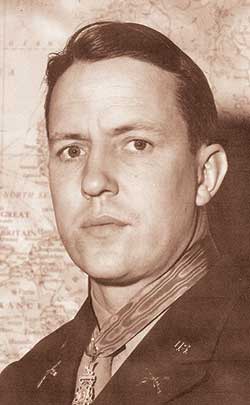by Tom Chillemi –
On Veterans Day America reflects on the sacrifice of those who served to keep America free. Something is lost in the translation of war statistics when battle statistics are listed in mass numbers. It’s hard to visualize the numbers who have died in unknown fields halfway around the world. During the invasion of Italy in World War II, 10,000 men, about the population of Middlesex County, died in the battle of Anzio, Italy. Among those soldiers who took part in the invasion of Italy was Captain Beryl R. “Dick” Newman of Remlik.
In 1990, the Sentinel interviewed Newman who gave the following account of a skirmish on May 26, 1944 that would lead to him receiving the Medal of Honor — the nation’s highest military honor.
Urbanna Creek bridge name
The bridge over Urbanna Creek is named in his honor. However the small green sign gives no clue as to who Newman was, or what he went through.
The following is the story as told in the May 24, 1990 Southside Sentinel.
Newman was 32 years old and “scared to death” when he landed on the beach at Anzio in the spring of 1944 as an infantryman. “You knew your name had to be on a bullet,” said Newman as he recalled the events.
 His company had been replaced four times during the campaign as the battle took its toll, he said. Another company was replaced 23 times. “The average life of an infantryman there was three minutes,” said Newman who had survived 500 days of combat before he landed at Anzio. For a year he had fought Rommel’s Army across north Africa with the Fifth Army under General Mark Clark.
His company had been replaced four times during the campaign as the battle took its toll, he said. Another company was replaced 23 times. “The average life of an infantryman there was three minutes,” said Newman who had survived 500 days of combat before he landed at Anzio. For a year he had fought Rommel’s Army across north Africa with the Fifth Army under General Mark Clark.
The worst casualties were the replacements who “didn’t react to orders quick enough,” he said. “When you yelled ‘down’ if they weren’t on the ground by the time the ’n’ came out there was a good chance you had a casualty.”
Invasion
Anzio was the Allied invasion of Italy. From the base on the beach the troops would fight for over two months to break through the German defenses, said Newman. In the mountains eight miles away the Germans’ heavy artillery pinned down the troops. The Americans could hear the “moaning” of the 16-inch shells dubbed the “Anzio Express” as they came in, said Newman. “You knew that sooner or later you would get killed.
“Much of his time there was spent on my patrols in the perimeter around the front line to keep them (the enemy) messed up,” he said. What little sleep troops could get was taken between the noise of shooting. Under the stress of battle and living on the infamous “C” rations Newman lost 50 pounds from his 6 foot frame. We couldn’t go outside because there were snipers waiting 300 yards away.”
Break out
On the 62nd day of this battle Lt. Newman was ordered to move his platoon forward as the “point for the company.” Newman said that as he and a scout approached a manor house they spotted a bank of German machine gun nests “about the same time they spotted us.”
Newman “sprayed the nest” with his Thompson .45 caliber machine gun and they returned fire. “It was a miracle I didn’t get it.”
But a bullet came close. His machine gun’s rifle stock got a bullet hole in it during the exchange of fire. “I had an angel on my shoulder. The good Lord had something to do with it.”
When Newman captured the first nest on the right he discovered the captured Machine gun was jammed. He got it unstuck and used it to “displace” the Germans who were 30 to 40 yards away. “They took off running,” he said.
He knocked out the other nests, killing 16, capturing 19, of the enemy.
With the machine gun nests gone, a thousand-yard-wide hole was opened in the German line through which the allied forces could advance.
For his bravery Newman was awarded the Medal of Honor by President Franklin D. Roosevelt.
Few days later Newman was riding on a tank when it ran over a mine. The explosion lifted the heavy tank off the ground and he was thrown to the ground and received a head injury that would take him out of the war.
He suffered constant headaches for 17 years, he said and still had problems controlling the pain for most of his life. Those who remember “Captain Dick” in his later years recall he wore a bandage over his ears to ease the pain.
Newman said he never hesitated to join the Army. He enlisted in Nov. 1941. “This is a country worth fighting for. Enemies are going to always take away God-given rights,” he said. “We’re a lucky country because we always go by the laws of God and man.”
Newman died March 8, 1998 at the age of 86.



